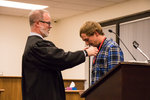






A young man’s harrowing climb from a life of crime and drug abuse to newfound sobriety was the subject of Lewis County Drug Court’s 200th graduation — held Monday at the Lewis County Law and Justice Center — that saw Jessie McCracken-Bates recognized for his efforts in successfully completing the treatment program.
Surrounded by dozens of cheering family members and friends, a beaming McCracken-Bates was forthright about the travails he endured on his way to reaching a point in his life where he’s now gainfully employed and drug free.
“I would say the biggest lesson I learned was having integrity and doing the right thing when no one’s looking,” McCracken-Bates, 22, told The Chronicle moments before joining Judge Andrew Toynbee to officially dismiss the felony charge that got him into the program.
McCracken recounted his past methamphetamine use and brushes with the law, highlighted by two second-degree burglaries and other forms of non-violent criminal behavior that landed him in custody. While in the Lewis County Jail after his most recent felony arrest, he applied to be a part of Drug Court — a therapeutic court involving rehabilitative treatment and meeting set goals that checked up on his progress through urine samples. Drug Court graduates see the felony charge that got them into the program dismissed.
The Drug Court’s rehabilitation plan, as described by Toynbee, is to offer non-violent individuals facing drug-related criminal charges a way out of incarceration by adhering to certain rules mandating participants to conduct themselves as law-abiding citizens.
“Now I’m being a constructive member of society and being productive with my life. A (few) years ago, I was just running the streets and doing all kinds of criminal behavior. I wasn’t on the right track,” said McCracken-Bates, who currently works for a roofing construction firm and counts fishing, bowling, movies and working on cars as his favorite hobbies.
The celebratory affair featured Toynbee and others sharing their satisfaction in witnessing McCracken-Bates’ progress over the past two years. In fact, the judge mentioned how his latest graduate would communicate his progress by often writing essays on a wide spectrum of topics from making his bed in the morning to being punctual.
Attendees also learned of McCracken-Bates’ positive influence on new Drug Court participants, as he recently “blew away” Drug Court with profound statements that “showed a lot of insight in not only how you’ve changed, but (also) in the value of this program,” Toynbee said.
The judge also noted how the ongoing encouragement provided by McCracken-Bates’ parents — Teresa and Chris — were key factors in the graduate’s persistence to meet every challenge of the Drug Court program.
His parents were joined by McCraken-Bates’ sister, Jaylyn, 11, his grandmother, Virginia McCarcken and a host of aunts, uncles and other relatives, who frequently broke out into spontaneous fits of applause throughout the gathering.
Others who issued praise included Ann Shoddy, Alexis Thurber and Carol Vogel of The Eugenia Center; Drug Court staffers Stephanie Miller and Jan Self; prosecuting attorneys Alysha Chandra and Sam Groberg; program donors Bob and Jan Cosser, along with Deputy Kevin Dickey from the Sheriff’s Office, who recalled his first meeting McCracken-Bates when he was kicked out of school for smoking marijuana at the age of 13.
“Jesse was really a delinquent. He just didn’t have a care in the world,” recalled Dickey. “So, we had a discussion about smoking pot and how that led to other things … I kept thinking that one of these days, he’s going to come to Drug Court. … To see you standing here, it was definitely a miracle that you got what you needed.”
After lauding McCracken-Bates for his accomplishment, Dickey turned his attention to other former and current Drug Court participants in attendance and cautioned that the road to redemption doesn’t end when the moment they get their graduation certificate.
“Drug Court doesn’t change you — you change you. The accountability has to come from within you. We’ve been holding all of you accountable, but now you have to do it for yourself. When you walk out that door and you decide ‘I’m not going to get high today,’ that’s when you’ll know you’re in recovery. I pray for you that when you walk out that door, it’s an easy decision,” advised Dickey.
Toynbee said even those who relapse and are “terminated” from the program often find themselves “doing better” than individuals who never participated in Drug Court.
In McCracken-Bates’ case, Toynbee explained how one of his peers reporting one of the graduate’s criminal misdeeds within his first few months of treatment resulted in the Centralia resident’s turning point that compelled him to get serious about the program.
Getting called on it by somebody who’s not an authority figure, “but someone he respected” had a significant impact on McCracken-Bates, said Toynbee, as he pointed out that peer support is a “hugely important” aspect in an individual’s struggles in conquering the obstacles associated with rehabilitation.
The judge also indicated how many Drug Court graduates often go on to pursue careers as chemical dependency professionals once they graduate. It was noted they’ll typically gravitate toward counseling addicts.
“It’s kind of a common thing that they go back to school and some people end up completing (their education) and some people don’t. But I bet there’s probably a decent percentage who deliver these services, the counseling, who have been in Jesse’s shoes,” said Toynbee.